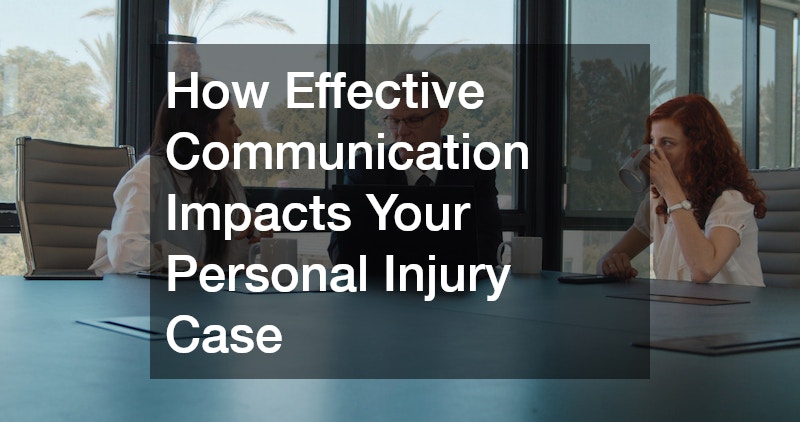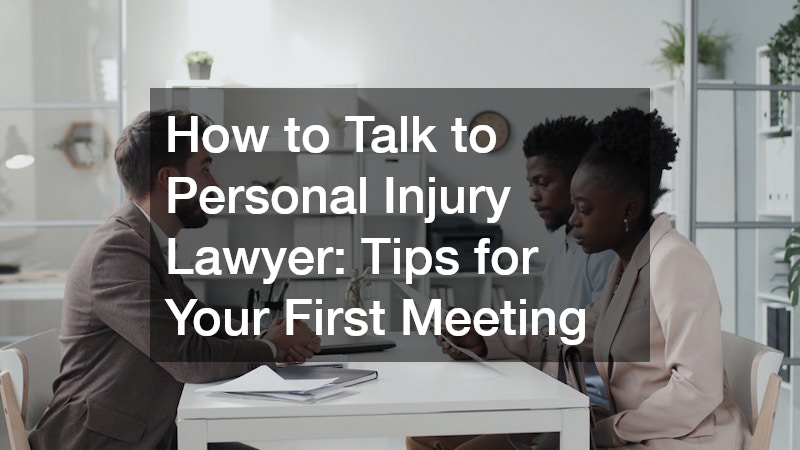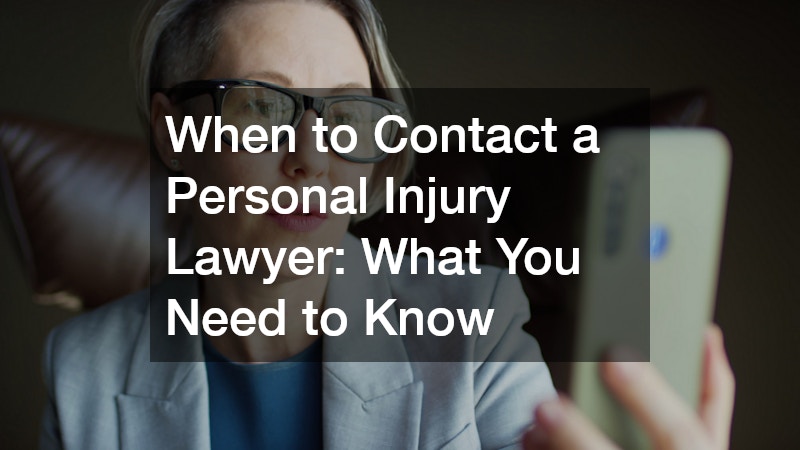
If you’ve been hurt in an accident, speaking with a personal injury lawyer is one of the best steps you can take to protect your legal rights. However, many people feel unsure about how to approach the conversation, what to say, or what to expect from the legal process.
This guide breaks down how to talk to a personal injury lawyer, including preparation, important questions to ask, and key legal concepts you should know. Whether your injury comes from a car crash, workplace accident, or slip and fall, understanding these basics will help you get the most out of your lawyer consultation and improve your chances of a successful claim.
How Effective Communication Impacts Your Personal Injury Case

Effective communication with your lawyer is critical. Personal injury cases often involve complex legal rules, deadlines, and paperwork. Your lawyer needs clear and accurate information to build a strong case on your behalf. Likewise, you need to understand the legal process, your options, and how to avoid mistakes that could harm your claim.
Good communication leads to:
- Better legal strategy tailored to your situation.
- More accurate assessment of your potential compensation.
- Fewer misunderstandings or delays.
- Greater confidence in your case moving forward.
Preparing to Talk to a Personal Injury Lawyer
Preparation helps you make the most of your lawyer meeting and ensures you provide the information needed for your case evaluation.
Collect Important Documents
Bring all relevant documents that show the details of your injury and accident, such as:
- Medical records and treatment bills, including emergency room and follow-up visits.
- Police or accident reports, which establish what happened and who may be at fault.
- Photographs or videos of your injuries, accident scene, or damaged property.
- Insurance policies and any letters or settlement offers from insurers.
- Witness contact information, if applicable.
Write a Clear Summary of the Incident
Write down a straightforward account of the accident, including:
- Date, time, and location of the injury.
- How the injury occurred and who was involved.
- Your symptoms, medical treatment, and recovery progress.
- How your injury has impacted work, daily activities, and quality of life.
This summary helps you stay organized and ensures you don’t miss important details during the meeting.
Understand the Statute of Limitations
Each state has a deadline, called the statute of limitations, for filing a personal injury lawsuit. Knowing this deadline is crucial—missing it can mean losing your right to sue. Your lawyer will advise you on how much time you have based on where you live and the type of injury.
What to Expect During Your Lawyer Consultation
Your first meeting or phone call with a personal injury lawyer is an important step in your case. This consultation allows the lawyer to gather the information they need to evaluate your claim, and it gives you the chance to learn how they can help. Here’s a detailed look at what typically happens during this initial conversation:
Detailed Questions About Your Accident and Injury
The lawyer will ask you to describe the accident and how you were injured in as much detail as possible. Expect questions like:
- When and where did the accident happen?
- What exactly occurred during the incident?
- Who else was involved or witnessed the accident?
- What injuries did you suffer, and how have they affected your life?
- What medical treatments have you received so far?
- Have you missed work or experienced other financial losses due to the injury?
These questions help the lawyer understand the facts, identify who may be legally responsible, and estimate the types of damages you could claim. Be honest and thorough—details matter in building a strong case.
Explanation of Your Legal Rights and Possible Outcomes
Based on the information you provide and their legal expertise, the lawyer will explain your rights under the law. They’ll outline:
- Whether you have a valid personal injury claim.
- What types of compensation you might be eligible for (medical bills, lost wages, pain and suffering, etc.).
- Potential challenges or defenses the other side might raise.
- How the legal process typically works from start to finish.
This helps set realistic expectations and lets you understand what pursuing a claim might involve.
Overview of the Legal Process
Your lawyer will walk you through the steps involved in pursuing a personal injury case, including:
- Filing a formal claim or lawsuit within the required time limits (statute of limitations).
- Gathering evidence, such as medical records, witness statements, and expert reports.
- Negotiating with insurance companies or opposing counsel to reach a settlement.
- Preparing for trial if an agreement cannot be reached out of court.
Knowing this process upfront helps you stay informed and prepared for what lies ahead.
Discussion of Fee Structure
Most personal injury lawyers work on a contingency fee basis, meaning they only get paid if you win your case or reach a settlement. During your consultation, the lawyer will explain:
- Their fee percentage and what it covers.
- Any additional costs or expenses you might be responsible for (such as court fees or expert witness costs).
- How and when fees are deducted from your compensation.
Understanding fees early prevents surprises and helps you decide if you want to move forward.
Evaluating the Lawyer’s Expertise and Fit
The consultation is also your opportunity to assess whether this lawyer is the right fit for you. Consider:
- Does the lawyer listen carefully and answer your questions clearly?
- Do they have experience handling cases similar to yours?
- Are they transparent about the strengths and weaknesses of your claim?
- Do you feel comfortable trusting them with your case?
Remember, good communication and trust are essential for a successful attorney-client relationship.
Important Legal Terms You Should Know

Understanding basic legal terms can help you follow your case better:
- Liability: Legal responsibility for the accident or injury.
- Damages: The money compensation you may receive for medical bills, lost wages, pain and suffering, and more.
- Settlement: An agreement reached outside court where the defendant pays you an agreed amount.
- Statute of Limitations: The deadline for filing a lawsuit.
- Contingency Fee: A payment arrangement where the lawyer’s fee is a percentage of the settlement or judgment.
- Discovery: The pre-trial phase where both sides exchange evidence and information.
Key Questions to Ask Your Personal Injury Lawyer
Asking informed questions helps you understand your case and lawyer’s role better. Here are some important questions to consider:
- Do I have a strong case based on the facts?
- What kinds of compensation am I eligible for?
- What evidence will I need to support my claim?
- How long will my case likely take to resolve?
- What are the risks or challenges in my case?
- How will you communicate with me during the process?
- What are your fees and costs? Are there any upfront charges?
- What happens if I lose the case?
How to Communicate Effectively With Your Lawyer
Good communication is one of the most important parts of a successful personal injury case. When you and your lawyer keep a clear and open line of communication, it helps the legal process run more smoothly and improves your chances of getting a fair outcome. Here are some key tips to help you communicate effectively with your personal injury lawyer:
Be Honest and Complete
Always provide your lawyer with honest and thorough information about your case, even if some details seem uncomfortable or you’re worried they might hurt your claim. Your lawyer needs the full picture to build the strongest case possible. Withholding facts or exaggerating the story can backfire and damage your credibility later on.
Keep Organized Records
Maintain copies of all documents related to your injury and claim, such as medical bills, accident reports, correspondence with insurance companies, and receipts for any expenses. Keeping these records organized and accessible will help you quickly provide what your lawyer needs and avoid delays.
Respond Promptly
Try to reply to your lawyer’s calls, emails, or messages as soon as possible. Delayed communication can slow down your case and frustrate your lawyer. If you need more time to gather information or documents, let your lawyer know so they can adjust the timeline.
Follow Your Lawyer’s Guidance
Your lawyer has experience with personal injury cases and understands the legal process. Follow their advice carefully, especially when it comes to communicating with insurance companies, the other party, or witnesses. Avoid speaking to anyone about your case without your lawyer’s approval, as careless statements could weaken your claim.
Protect Your Privacy on Social Media
Be cautious about what you post online related to your injury or case. Insurance companies and opposing lawyers often monitor social media to find statements or photos that can be used against you. Avoid sharing details about your injury, recovery, or legal matters until your case is resolved.
Ask Questions and Clarify When Needed
If your lawyer uses legal terms or explains something you don’t understand, don’t hesitate to ask for clarification. It’s important that you fully grasp your case status and next steps. Clear communication is a two-way street—your lawyer wants you to feel informed and confident throughout the process.
What Not to Do When Talking to a Personal Injury Lawyer
Avoid these common mistakes that can weaken your case:
- Don’t exaggerate or provide false information. It can harm your credibility and case.
- Don’t admit fault or apologize for the accident; let your lawyer handle liability issues.
- Don’t settle or sign documents without consulting your lawyer.
- Don’t discuss your case publicly or on social media.
After the Consultation: What Happens Next?
If you decide to hire the lawyer, they will:
- Investigate your accident thoroughly by gathering evidence and expert opinions.
- Help you get the medical treatment you need and track your expenses.
- Negotiate with insurance companies on your behalf for a fair settlement.
- Prepare your case for trial if settlement talks don’t work out.
Your lawyer will guide you step-by-step through this process, keeping you informed and advising you on decisions.
When Should You Definitely Talk to a Personal Injury Lawyer?
It’s important to reach out to a lawyer if:
- Your injuries require ongoing medical treatment or cause disability.
- The accident was not your fault, but the other party denies responsibility.
- You’ve been contacted by an insurance company that’s offering a low settlement.
- You are unsure about your legal rights or the claim process.
- You want professional help to handle paperwork and negotiations.
Final Thoughts
Talking to a personal injury lawyer is a critical step to protect your rights after an accident. Preparing your information, understanding key legal terms, and asking the right questions helps you get the best advice possible.
A trusted personal injury lawyer can guide you through the complex legal system, fight for fair compensation, and give you peace of mind during a difficult time. If you’ve been injured and aren’t sure where to start, don’t hesitate to reach out to a qualified lawyer for a free consultation.


